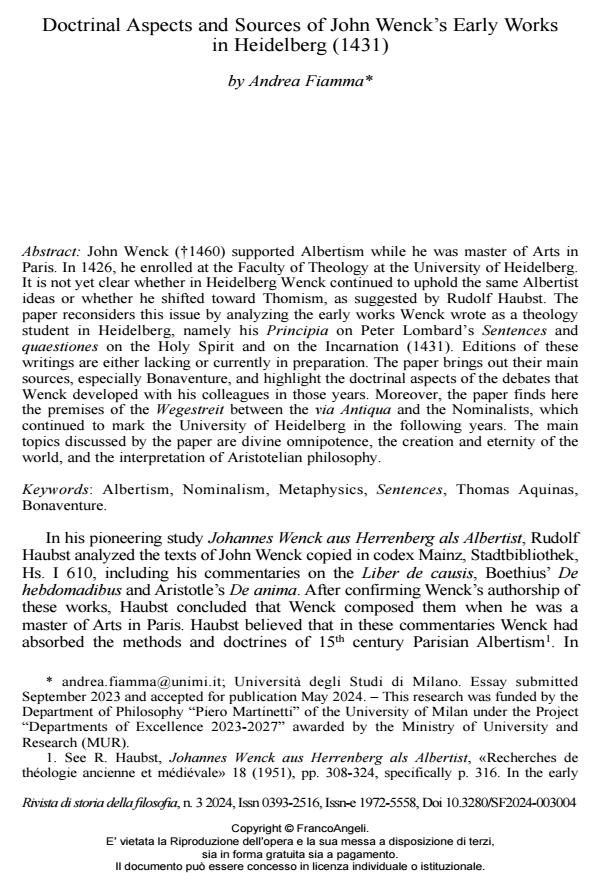Doctrinal Aspects and Sources of John Wenck’s Early Works in Heidelberg (1431)
Titolo Rivista RIVISTA DI STORIA DELLA FILOSOFIA
Autori/Curatori Andrea Fiamma
Anno di pubblicazione 2024 Fascicolo 2024/3
Lingua Inglese Numero pagine 33 P. 549-581 Dimensione file 407 KB
DOI 10.3280/SF2024-003004
Il DOI è il codice a barre della proprietà intellettuale: per saperne di più
clicca qui
Qui sotto puoi vedere in anteprima la prima pagina di questo articolo.
Se questo articolo ti interessa, lo puoi acquistare (e scaricare in formato pdf) seguendo le facili indicazioni per acquistare il download credit. Acquista Download Credits per scaricare questo Articolo in formato PDF

FrancoAngeli è membro della Publishers International Linking Association, Inc (PILA)associazione indipendente e non profit per facilitare (attraverso i servizi tecnologici implementati da CrossRef.org) l’accesso degli studiosi ai contenuti digitali nelle pubblicazioni professionali e scientifiche
John Wenck (†1460) supported Albertism while he was master of Arts in Paris. In 1426, he enrolled at the Faculty of Theology at the University of Heidelberg. It is not yet clear whether in Heidelberg Wenck continued to uphold the same Albertist ideas or whether he shifted toward Thomism, as suggested by Rudolf Haubst. The paper reconsiders this issue by analyzing the early works Wenck wrote as a theology student in Heidelberg, namely his Principia on Peter Lombard’s Sentences and quaestiones on the Holy Spirit and on the Incarnation (1431). Editions of these writings are either lacking or currently in preparation. The paper brings out their main sources, especially Bonaventure, and highlight the doctrinal aspects of the debates that Wenck developed with his colleagues in those years. Moreover, the paper finds here the premises of the Wegestreit between the via Antiqua and the Nominalists, which continued to mark the University of Heidelberg in the following years. The main topics discussed by the paper are divine omnipotence, the creation and eternity of the world, and the interpretation of Aristotelian philosophy.
Parole chiave:Albertism, Nominalism, Metaphysics, Sentences, Thomas Aquinas, Bonaventure.
Andrea Fiamma, Doctrinal Aspects and Sources of John Wenck’s Early Works in Heidelberg (1431) in "RIVISTA DI STORIA DELLA FILOSOFIA" 3/2024, pp 549-581, DOI: 10.3280/SF2024-003004